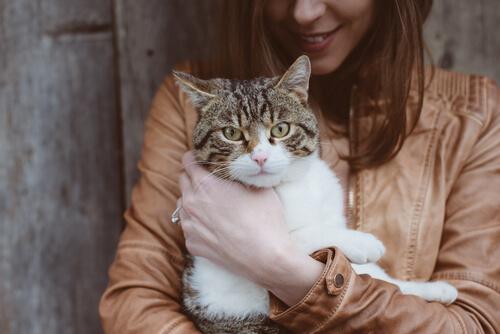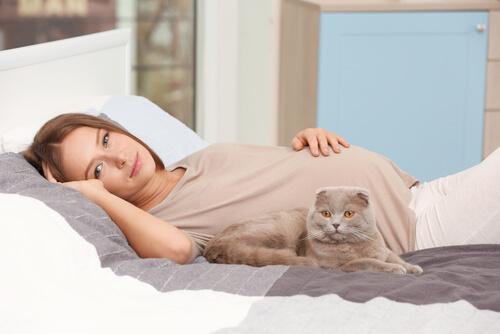Myths About Pregnancy and Cats

There are many misconceptions about pregnancy and cats. Most of them are false and are based on isolated cases. If you’re currently pregnant or are planning to have a child, then you might want to read this article instea of giving your pet up for adoption!
Myths about pregnancy and cats
Many people still consider that pregnant women shouldn’t have cats in their home. And many people still believe that domestic cats can make a pregnant woman and her baby sick.
While it’s true that cats can carry a disease called toxoplasmosis, which is fatal to fetuses, it’s also true that not all cats have it.
The worst part is that every year, thousands of cats are abandoned or given up for adoption when their human “parents” decide to have a child.
This is a really unfair situation that’s mostly based on lack of information or myths about pregnancy and cats, such as the ones that are listed below:
1. All cats have toxoplasmosis
This is a myth about pregnancy and cats that is completely false. First of all, for the animal to be able to spread the disease, it must consume raw meat or lunch meats. This is not very common because most cats eat cat food and don’t go outside that much.

Second, that food must be contaminated with the parasite that causes the disease, Toxoplasma gondii.
Third, a pregnant woman has to come into contact with the animal’s feces. If the litter box is located on the balcony and someone else is responsible for emptying it, then a pregnant woman’s chances of getting infected are quite low.
Something else that’s worth noting is that some women already have the necessary antibodies to fight the virus. This is the case if they became infected in the past, before their pregnancy. Such immunity is passed down to the baby, so the mother won’t have anything to worry about.
2. Cats cause abortions
Who really knows where this “theory” came about or the myth about cats making women infertile. Living with these pets don’t affect a woman’s fertility or pregnancy.

It doesn’t matter if the cat lived at home since it was a kitten or it was adopted. There is no scientific evidence to prove that cats can cause abortions. If not, female vets wouldn’t be able to become mothers.
3. Cat hair and dander are dangerous
Allergic reactions or asthma caused by cat hair can appear at any stage of life, but they only appear in 10% of the population. Some common symptoms are sneezing or hives.
If the woman is allergic to cat dander or hair, she can take some extra steps when expecting a baby, such as not letting her cat get on the bed, ventilating the rooms, or vacuuming the carpets and sofas more often. However, if she hasn’t shown any allergy symptoms so far, she doesn’t have to do anything.
4. Cats are aggressive and can injure a pregnant woman
Some people say that cats are “aggressive” and bring bad luck. These statements are based on ignorance towards cats… Yes, people can say that cats are very expressive animals that show their feelings through their claws and teeth.
But there’s nothing to indicate that they’re aggressive around pregnant women. They even feel less jealous than dogs in this situation.
Not only are there myths about pregnancy and cats, but also there are myths about when a baby is born. For no reason at all, people say that a cat can attack a baby when they’re asleep. Yes, they may be more protective of the baby or the baby may cause them to be curious, but it’s highly unlikely that a cat will hurt a bay, much less on purpose.
This text is provided for informational purposes only and does not replace consultation with a professional. If in doubt, consult your specialist.